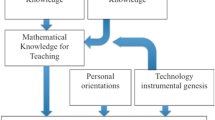Abstract
Teaching in general and teachingof mathematics in particular are matters ofgreat importance for contemporary society.Over the years, societies have establishedinstitutions in order to incorporatemathematics and science into the culture ofsociety with the clear intention ofencouraging a scientific vision of theworld among the population. This intensesocial process of scientific enlightenment has helped us recognize theneed to implement educational modificationsin the specific field of mathematics basedon designs that are better adapted toschool practices. Mathematics educationdeals with the systematic study of theeffects of such processes; in this paper,we have decided to describe a certainevolution of its research problems.
Similar content being viewed by others
REFERENCES
Artigue, M.: 1992, ‘Didactic engineering’, Recherches en Didactique des Mathématiques. Selected Papers, 41–66.
Artigue, M.: 1999, ‘L'évolution des problématiques en Didactique de l'Analyse’, Recherches en Didactique des Mathématiques 18 (1), 31–63.
Biehler, R., Scholz, R.W., Sträßer, R. and Winkelmann, B. (eds.).: 1994, Didactics of Mathematics as a Scientific Discipline, Kluwer Academic Publishers, Dordrecht.
Brousseau, G.: 1986, ‘Fondements et méthodes de la didactique des mathématiques’, Recherches en Didactique des Mathématiques 7(2), 33–112.
Cantoral, R.: 2000, El futuro del cálculo infinitesimal. ICME 8, Sevilla, España, Mexico: Editorial Iberoamérica.
Cantoral, R.: 1997, An example of the Sociological Point of View in Math Education: The Case of Analytical Functions at the University Level, Principal speaker, Conference on Research in Mathematics Education. Michigan State University, USA.
Cantoral, R. and Farfán, R.: 1998, ‘Pensamiento y lenguaje variacional en la introducción al análisis’, Épsilon 42, 353–369.
Cordero, F.: 1994, Cognición de la integral y la construcción de sus significados (un estudio del discurso matemático escolar, Cinvestav Doctoral Thesis-IPN, Mexico.
D'Amore, B.: 1999, Elementi di Didattica della Matematica, Pitagora Editrice, Bologna, Italia.
Douady, R.: 1995, ‘La ingeniería didáctica y la evolución de su relación con el conocimiento’, in P. Gómez (ed.), Ingeniería didáctica en educación matemática, Editorial Iberoamérica, Colombia, pp. 61–96.
Dubinsky, E. and Harel, G. (eds.).: 1992, The Concept of Function: Aspects of Epistemology and Pedagogy, The Mathematical Association of America, Notes Vol. 25.
Farfán, R.: 1995, ‘Ingeniería Didáctica’, Pedagogía 10 (5), 14–23.
Farfán, R.: 1997, ‘La investigación en matemática educativa en la reunión centroamericana y del Caribe referida al nivel superior’, Revista Latinoamericana de Investigación en Matemática Educativa 1 (0), 6–26.
Farfán, R.: 1997a, ‘Problemática de la enseñanza de lasmatemáticas en América Latina’, in D. Calderón and O. León (eds.), La didáctica de las disciplinas en la educación básica, Universidad Externado de Colombia, Bogotá, pp. 123–146.
Farfán, R.: 1997b, Ingeniería Didáctica: Un estudio de la variación y el cambio, Editorial Iberoamérica, Mexico.
Farfán R.: 1998, ‘Problemi e sfide dell'insegnamento della Matematica nell'America Latina’, in D'Amore (ed.), Diversis Aspetti e Diversi Àmbiti della Didattica della Matematica', incontri con la Matematica 12, Pitagora Editrice, pp. 25–32, Italia.
Filloy, E.: 1981, ‘Investigación en matemática educativa en México. Un reporte’, Recherches en Didactique des Mathématiques 2 (2), 233–256.
Garnica, I.: 1988, Elementos para un estudio introductorio a la actividad educación matemática, Master's Thesis. Cinvestav-IPN, México.
Hitt, F.: 1998, ‘Matemática Educativa: Investigación y desarrollo 1975–1997’, in F. Hitt (ed.), Investigaciones en Matemática Educativa II, Editorial Iberoamérica, Mexico, pp. 41–65.
Imaz, C.: 1987, ‘Qué es la Matemática Educativa?’, in E. Bonilla, O. Figueras and F. Hitt (eds.), Publicaciones Centroamericanas 1 (1), 267–272.
Nesher, P. and Kilpatrick J. (eds.): 1990, Mathematics and Cognition: A Research Synthesis of the International Group for the PME, Cambridge University Press, Cambridge.
Sierpinska, A.: 1992, ‘On understanding the notion of function’, in E. Dubinsky and G. Harel (eds.), The Concept of Function: Aspects of Epistemology and Pedagogy, The Mathematical Association of America, Notes Vol. 25, pp. 23–58.
Tall, D. (ed.).: 1991, Advanced Mathematical Thinking, Kluwer Academic Publishers, Dordrecht.
Vinner, S. and Tall, D.: 1981, ‘Concept image and concept definition in mathematics with particular reference to limits and continuity’, Educational Studies in Mathematics 12, 151–169.
Waldegg, G. (ed.): 1996, Procesos de enseñanza y aprendizaje (3 Vols.) Consejo Mexicano de Investigación Educativa, AC México.
Author information
Authors and Affiliations
Corresponding author
Rights and permissions
About this article
Cite this article
Cantoral, R., Farfáan, R.M. Mathematics Education: A Vision of Its Evolution. Educational Studies in Mathematics 53, 255–270 (2003). https://doi.org/10.1023/A:1026008829822
Issue Date:
DOI: https://doi.org/10.1023/A:1026008829822




